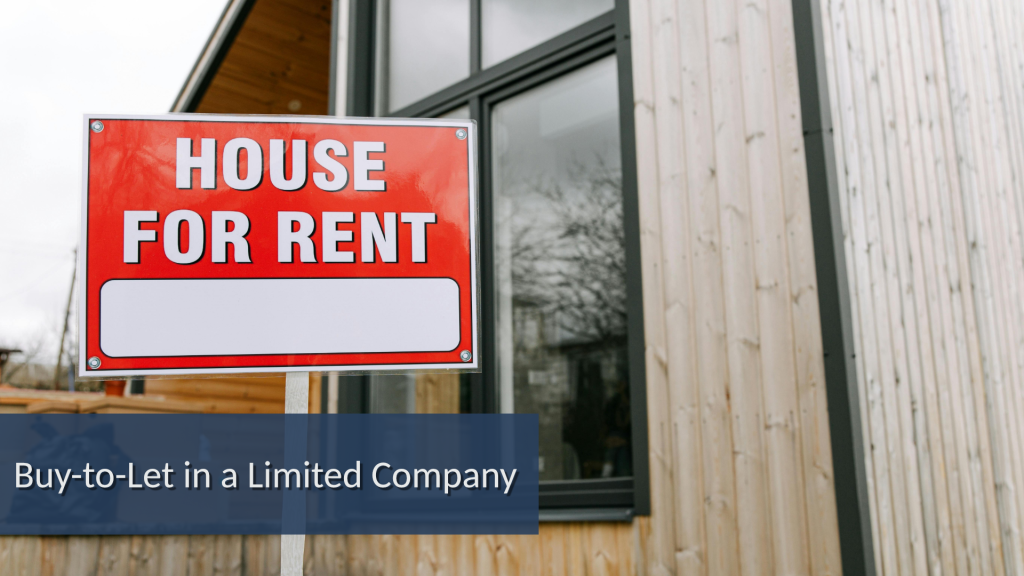Investing in buy-to-let properties is an excellent way to build wealth, but one important decision is how to structure your investments. Many property investors are opting to purchase buy-to-let properties through a limited company. While there are pros and cons to each ownership structure, using a limited company can offer significant advantages, particularly when it comes to taxes and financial planning some prefer the simplicity of of holding property in their own name.
If you are weighing both options, read out post on the Benefits of Buying Your Buy-to-Let in Your Own Name for additional insights. At Goldhouse Accounting, we advise property investors on their best tax strategies. Here are five reasons to consider holding your buy-to-let in a limited company.
1. Interest is Fully Tax Deductible
One of the most significant advantages of owning a buy-to-let property through a limited company is that you can deduct the full amount of mortgage interest from your rental income before paying corporation tax. This benefit is particularly attractive because, since 2020, individual landlords can only claim a basic rate deduction for mortgage interest. In contrast, limited companies can continue to offset the entire interest payment, providing a valuable tax-saving opportunity.
Key benefits:
- Full tax deduction on mortgage interest.
- Lower taxable rental profits.
- Reduced overall tax burden.
For landlords with significant mortgage debt, owning the property through a company can be a more tax-efficient solution.
2. Control Your Tax Liabilities
Holding a buy-to-let property in a limited company offers more flexibility and control over how and when you take income from your investment. As the owner of a limited company, you can control your tax liabilities by deciding how much salary or dividends to withdraw. This allows you to manage your income and potentially keep yourself in a lower personal tax bracket.
Additionally, profits can be retained within the company, providing a further tax deferral advantage. These retained profits can be used for future property investments or improvements, without being taxed at the higher rates applicable to individuals.
Key benefits:
- Flexibility to manage personal tax exposure.
- Profits can be retained within the company.
- Deferral of personal tax on profits.
This tax control can be crucial for long-term wealth-building strategies and ensuring tax efficiency.
3. Contribute to a Pension Scheme
Another significant advantage of using a limited company to hold your buy-to-let property is the ability to make pension contributions. As the director of a limited company, you can contribute to your pension scheme directly from company profits, which is highly tax-efficient. These contributions can be made pre-tax, reducing your corporation tax liability.
This benefit allows you to invest in property while also preparing for the future with a pension fund that grows tax-free.
Key benefits:
- Tax-efficient pension contributions.
- Pre-tax contributions reduce company tax liabilities.
- Helps you build a secure financial future while investing in property.
By combining property investment with long-term pension planning, you can maximise the tax benefits of both.
4. Financing is No Longer an Issue
Although mortgage interest rates for limited companies are often higher than those for individuals, many lenders have expanded their offerings to meet the demand for limited company mortgages. As a result, securing financing for a limited company is no longer the challenge it once was.
Many investors are now able to find competitive mortgage deals specifically designed for limited companies, with the added benefit of the full tax deduction on interest payments (as mentioned earlier). This makes it a much more attractive option for property investors looking to expand their portfolios.
Key benefits:
- Greater availability of mortgage products for limited companies.
- Full interest tax deductibility on mortgage payments.
- Access to specialised mortgage deals for companies.
With mortgage products becoming more readily available for companies, the financing barrier has been lowered significantly.
5. Legacy and Succession Planning
One of the lesser-known advantages of owning property through a limited company is the legacy planning benefits. Transferring property held in your own name to your heirs can trigger significant inheritance tax charges. However, when properties are held in a limited company, it’s easier to pass down shares in the company to family members, potentially reducing tax liabilities.
By carefully structuring the ownership of the company, you can manage how assets are passed on, making it easier to manage inheritance tax planning. This can also help ensure a smooth transition of your property portfolio to the next generation.
Key benefits:
- Easier transfer of property ownership through company shares.
- Potential for reduced inheritance tax.
- More efficient legacy planning for property portfolios.
For property investors thinking about the long-term future of their portfolio, holding property through a limited company can offer significant inheritance tax benefits.
Conclusion
While purchasing a buy-to-let property in your own name offers simplicity, the tax advantages and financial control of holding the property in a limited company are increasingly attractive for investors. From the ability to fully deduct mortgage interest to enhanced legacy planning, owning your property through a company structure provides a range of benefits that can make your investment more profitable and sustainable.
At Goldhouse Accounting, we specialise in providing tax and financial advice tailored to property entrepreneurs. If you have any questions, you can contact a member of the team or in the meantime, check our our free resources including our guides and other blog posts. For more from us, visit our social media channels.




